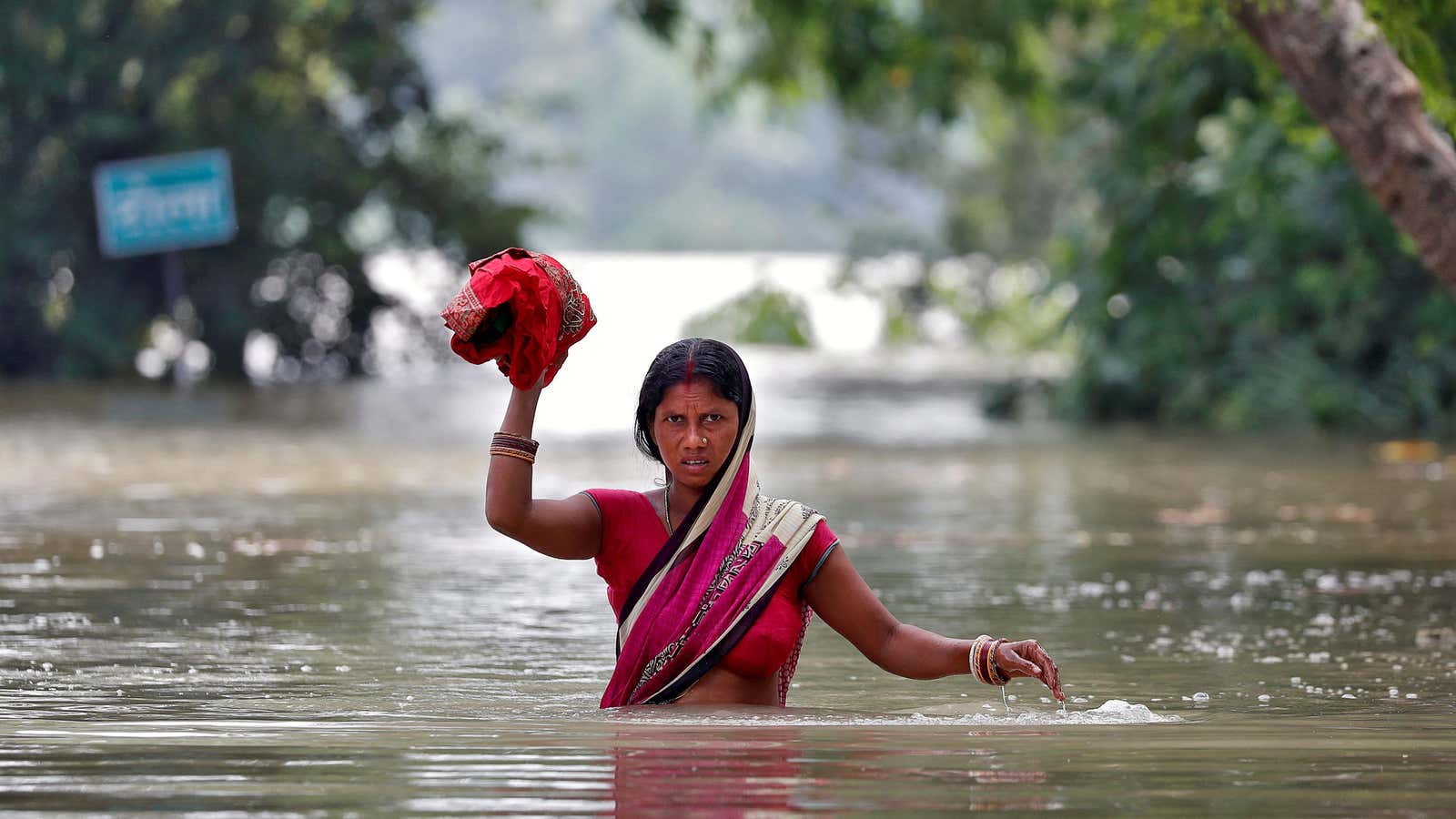Houston, Texas, has been transformed into a disaster zone, with 38 people dead from the tumultuous impact of Hurricane Harvey this week and the city submerged in 50 inches of water.
As some have pointed out, the Western media has focused intently on covering Houston’s disaster. Meanwhile, weather has been no less catastrophic in South Asia this summer, where monsoon rains caused floods that have killed more than 1,000 people in Bangladesh, India, and Nepal.
Depending on where you are in the world, one of those natural disasters will probably evoke more viscerally disturbing images—of people you know, or could know, of city streets and infrastructure that you can easily picture—than the other. If you live in the United States, there’s a good chance you’ve been reading incessantly about Hurricane Harvey, and know little of the floods in South Asia. Similarly, if you’re a Bangladeshi dealing with months of rain, an American flood likely doesn’t seem like big news.
It may seem callous to care more about a disaster closer to home than a larger one further away but these emotional responses are entirely human. Importantly, though, humans aren’t just emotional creatures; we also have the ability to reason. And, while it’s inevitable that our hearts will respond more strongly to a disasters nearer to us, we do have the capability to think clearly and react to humanitarian crises according to their need.
The juxtaposition between our emotional and rational response to international crises was highlighted by the father of capitalism, Adam Smith, in one of his lesser-known works, “Theory of Moral Sentiments.”
In it, Smith compares the emotional reaction most Westerners would have if (a) they were told the whole of China had been destroyed by an earthquake or (b) they were told they would lose their little finger.
He imagines that a European man who reads the news of China’s cataclysmic destruction would “express very strongly his sorrow for the misfortune of that unhappy people, he would make many melancholy reflections upon the precariousness of human life” and then would go about his normal life, more or less unperturbed.
A far smaller personal tragedy though—the loss of his little finger—would produce a much greater emotional response, Smith writes:
“If he was to lose his little finger to-morrow, he would not sleep to-night; but, provided he never saw them, he will snore with the most profound security over the ruin of a hundred millions of his brethren, and the destruction of that immense multitude seems plainly an object less interesting to him, than this paltry misfortune of his own.”
But does that mean such a person would choose to trade the lives of all those in China to save his little finger? Of course not. As Smith says, “Human nature startles with horror at the thought, and the world, in its greatest depravity and corruption, never produced such a villain as could be capable of entertaining it.”
Given that our feelings are so often self-centered, how do we explain so many examples of generous behavior? In Smith’s words, it is “not that feeble spark of benevolence which Nature has lighted up in the human heart,” that causes our most noble actions. Instead: “It is a stronger power, a more forcible motive, which exerts itself upon such occasions. It is reason, principle, conscience, the inhabitant of the breast, the man within, the great judge and arbiter of our conduct.”
Reason—not emotion—is what we use to adjust our outlook and respond appropriately to the suffering and successes of those around us, Smith argues, and this is what leads to virtue. There’s no need to increase our emotional response to others’ needs or reduce our deep feelings for our own suffering or that of people (or animals) closer to us. Instead, we must use our rational understanding of the world to guide us to appropriate behavior.
Contemporary thinkers have also echoed Smith’s emphasis on the importance of reason over emotions in making rational decisions. Yale psychologist Paul Bloom has written extensively on the problems with empathy. This emotion, he told Quartz, “zooms us in on the attractive, on the young, on people of the same race. It zooms us in on the one rather than the many. And so it distorts our priorities.”
Emotions are an important part of any moral decision: They move us to care about the needs of others, to invest in the wellbeing of those we don’t know. Even Bloom argues that sympathy (compassion for another’s needs, versus empathy’s attempt to feel other people’s experiences) is a necessary spark to motivate moral action.
But we have the intellectual capability to go beyond our emotional instincts. We can’t help but feel greater anguish when we encounter the suffering to those closer to us, but that doesn’t stop us from recognizing the gravity of international disasters. What matters most is action: Giving to and supporting people in need of help, whether they’re close to home or far away.
